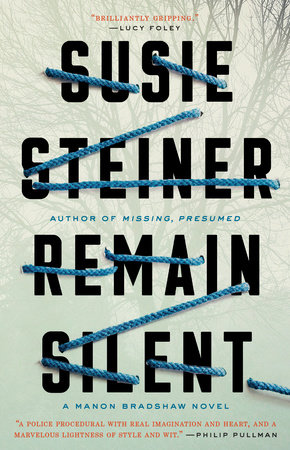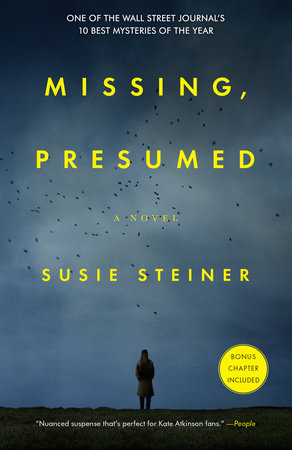Excerpt
Persons Unknown
Day 1, December 14
JON-OLIVER
Down. Dizzy. Pitching left. He is draining away like dirty water, round and round. Stumbling not walking, the ground threatening to come up and meet him. And yet he presses on. Something’s not right.
He is swampy, heavy-footed. His shin is throbbing. A scuffle—like being spun in blindman’s buff—so quick that when it was over he thought he’d been mugged, but he patted himself down and his wallet and phone were there all right.
His muscles are soupy, unresponsive. His legs wade, the landscape too broad for him to make headway. The air is close like a wet web. He can barely draw breath.
He stumbles to the right, into a muddy wooded area in a direction he hadn’t intended to take, and it’s as if the ground is reaching for him. Is it quicksand, not mud?
He’s really scared now; nervously places a hand to his chest. His shirt is wet through but it’s not raining. He looks at his hand. It is glistening dark; the color unclear because of the dark and the orangy street lighting
He starts to panic, cannot fill his lungs. What is happening to him?
He falls into the mud, feels some arms take him up and cradle him, looks up to see blond hair. The alien scent of perfume.
Saskia?
“Sass?” he whispers, confused. Is she the cause of this, after all her stupidity? She went too far and he couldn’t stop her.
“Sass?”
His sight dims, he is too tired.
The world dips.
MANON
Crisp in one hand, sandwich in the other; the tickle and press of light internal kneading around her pelvis, like butterflies in a sack. Seems typical that pregnancy has brought zero in the way of nausea but has instead turbocharged Manon’s appetite.
She becomes aware of Harriet and Davy talking, urgent and low, on the other side of the open-plan office. Something’s up. They’re quickening. Manon elongates her neck, craning to hear, but her colleagues are too far away
As they pass her desk she says, “What’s happening?”
“Job’s come in,” Harriet says, but it’s clear she can’t be bothered to fill Manon in.
“Ooh, who is it?” Manon says, through a mouth of sandwich.
They ignore her.
She looks at Davy, full of himself these days; Detective Sergeant Davy Walker, promoted by the Super, Gary Stanton. He might as well call Stanton “Daddy.” Well, he’s welcome to it. Manon is in hot pursuit of the work-life balance: desk job, regular hours, house full of children. She wants to focus on whether to sign up for an organic veg box or whether this would be taking her personal reinvention too far. You can lead a horse to uncooked beetroot . . .
And yet she is straining out of her seat to overhear the conversation between Harriet and Davy.
Manon butts in, saying, “I could be special adviser at the scene, brackets, teas . . .” Hopeful face.
When she’d first begged Harriet for a job back in the major crime unit, determined to leave behind the misery of the Met (awful boss, crushing workload) and the cost of London living, she said she’d do anything, didn’t care how boring. Cold cases.
“You don’t want to do cold cases,” Harriet said. “There is no greater career cul-de-sac than cold cases.”
“I do, seriously. Boring dead-end redundancy’s where I’m at.”
And cold cases is where she’s ended up, while her belly enlarges (now at the five-month mark), spending quite a few of her days following her Sat Nav inexpertly around the Fens—
Turn around where possible—to interview people who couldn’t remember much about last week, never mind a decade ago. Telling herself this is fine. This is what’s called Having It All (though most of the time, it feels like having small slivers of the duller bits), home by five, pick up some washing powder.
You have reached your destination on your right. Christ, really?
Harriet has marched off in a hurry.
“Davy, oi Davy,” Manon whispers loudly as he thumbs his mobile phone and Davy—who used to work for her, who used to do her bidding while she shushed him—shushes her with his finger. Now he’s the DS running the job while she . . . Well, she is quite tired to be fair
“Just tell me what’s up,” she says, when he’s off the phone.
“Stabbing, male, in Hinchingbrooke Park.”
“Nice of him to kark it so local.”
“Actually, he might not even be dead yet,” says Davy, eyes darting with all the thoughts he’s having, checklist and scene log and SOCO, no doubt. “Right by the forensics lab as well. We can all walk it from here. Really couldn’t be more convenient.”
And he is back on his mobile, heading for MCU’s double doors.
Her nineties house, squat in its tray of mown turf, the very image of a child’s drawing complete with pitched roof and windows like eyes. Not too bright: a stoic face, happy with its lot. Around the lawn is a frill of box hedging—so low you could step over it, and what’s the point in that, she wonders, remembering the burglary prevention advice she used to dole out when she was in uniform. Plant prickly bushes under windows.
Halt! This is a shrubbery! Her key in the plastic door with its fake leaded lights, letting herself in and noticing that the reality is a step removed from what she’d hoped for, moving back to Huntingdon. She thought it would be all spacious living and glorious rural(ish) childhoods for Fly and Solly
“I don’t want to bring up a black boy in London,” she said to her sister Ellie at the start of her campaign for them to move back to Cambridgeshire. This had followed Manon being summoned to the headmaster’s office at Fly’s vast, terrifying comprehensive school and an encroaching fear that he was getting in with the wrong crowd, or possibly that he
was the wrong crowd.
“That’s exactly where you should bring up a black boy,” Ellie said.
“And watch him get stopped and searched every five minutes of his life? Arrested for stuff he didn’t do? Looked at by old ladies who think he’s going to mug them? I watch them, you know, giving him a double take, and it breaks my fucking heart.”
“So what, you’d rather take him out to the bigotry heartlands, would you, where he’ll be the only black boy for miles around?” Ellie said. “You should see the old ladies out there.”
“We can’t afford to stay here. The rent’s crippling me. It’s crippling you as well. Come on, we could get a big house, the four of us. Fly would never agree to leave Sol, you know that.”
Ellie looked uncertain. “It is astronomical,” she admitted. “But God, I hate being uprooted. Having to start again somewhere new, making new friends. Makes me feel exhausted just thinking about it. I’ve got a group of mums I feel comfortably ambivalent about, right here.”
“We could get a mansion in Huntingdon or Ely or Peterborough,” Manon pleaded. “You could—”
“Start a course of antidepressants?”
“Go back to work.”
Their charmless four-bedroom house opposite police HQ in Hinchingbrooke is costing a fraction of what they were spending on two flats in the capital, and is more than double the size. They each—Manon, Ellie, twelve-year-old Fly (whose trainers alone, like cruise ships adrift, have their own housing needs), and Ellie’s nearlythree-year-old Solomon—have a capacious bedroom, hers and Ellie’s both with en suites. The house has one of those tacked-on hexagonal conservatories made from uPVC and, beyond, a 150-foot lawn dotted with menacing conifers. The Bradshaws can even boast a utility room (and what says you have arrived more than a utility room?) with gray marble-effect laminate worktops.
Manon calls “Hello?” into the volume of the house, clattering her keys onto a glass-topped console in the hallway (an irritant none of them could be bothered to remove—whatever domestic improvements are hatched in the utopias of the night are laid waste in the harumscarum day). She smells cooking—whatever Solly has just had for tea
She stands in the doorway to the lounge, already disappointed by the scene in front of her: an oatmeal vista, its candelabra lights descending stiffly from the low ceiling (a persecution of a ceiling—she feels at times as if it is lowering in real time and will one day crush her). The three-piece suite, extra wide and squat, is the most engulfing Manon has ever sat in, so much so that she often feels she is being consumed by it. Everything beige, so that the whole atmosphere is one of porridgy comfort. They’ve lived here for five minutes, and she’s already nostalgic for the high ceilings of Victorian London.
“Oh Fly, don’t play Temple Run with him,” she says, removing her coat. “His brain’s not even formed yet.”
“He loves it,” Fly answers without looking up from the iPad he is hunched over, Solly nestled in his lap. Manon walks back out to hang her coat on the banister and to drop her bag at the foot of the stairs.
Where is Ellie? At work? Her shifts run from 7:30 a.m. to 3:30 p.m. or 1:30 p.m. to 8:30 p.m., and this is considered part-time. The entire shift usually on her feet, sometimes with no chance for a break. When she’s on nights, she’ll often have Solly all day the next day because she’s trying to save money on the childminder (Ellie’s sense of impoverishment is their microclimate). She’ll doze on the sofa while he plays in front of rolling episodes of
Peppa Pig. There has never been a worse time to work for the NHS, Ellie says. The management obsessed with targets and budgets, every shift short-staffed. No love, only constraint and a communal sense of harassment. Yet her sister has also been a master of evasion lately, time thick yet hollow. The stresses and strains mingled with absences unexplained. “Shift ran over, sorry.” Or, “Training. Kept me late.”






